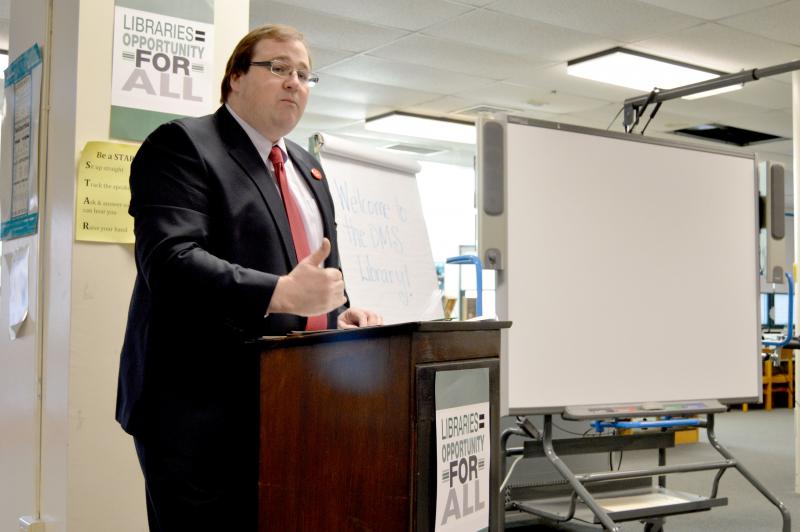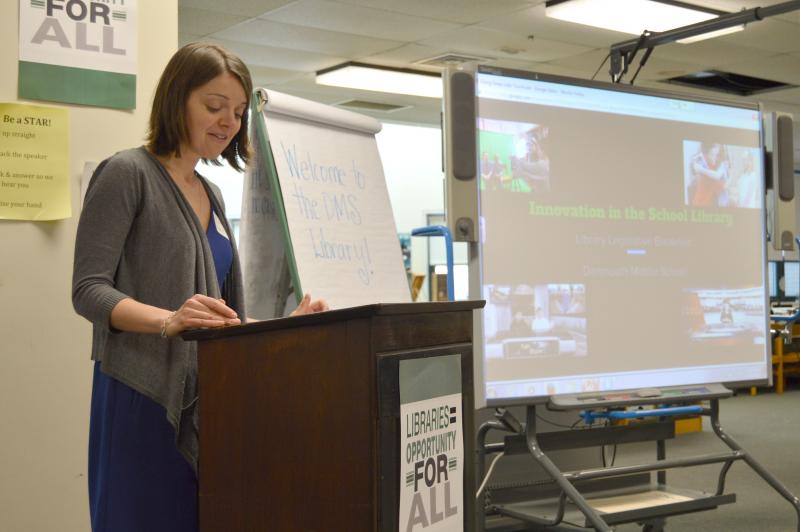DMS advocates for library funding, considered ‘best in class’
At the conclusion of a four-minute video to promote Dartmouth Middle School’s library, a student swirls around in her chair, points to the camera and declares: “This is not your grandmother’s library!”
The video, produced by 8th grader Braely Neto, was just one component of the school’s Legislative Breakfast, held on Feb. 12. The breakfast brought together the school community to advocate for state funding for libraries across Massachusetts. The middle school’s high-tech media center was the only school library to participate in this year’s line up of Massachusetts Library Association’s Legislative Breakfasts.
The main focus of the event was testimony from students, who all gave the library a glowing assessment for its focus on technology, its role as a social hub at the school, and its selection of books, audiobooks and e-books.
The speeches from students and state advocates were recorded and uploaded to YouTube.
“I would love to share the videos with my Facebook community and the School Library Association,” said librarian Laura Gardner. “This is a video they can share with all their constituencies to hopefully get more people to call their legislatures and share the power of school libraries.”
Commissioner George Comeau of the Massachusetts Board of Library Commissioners was impressed, calling the campus’ media center “the best in class” in terms of school libraries.
“There is a commitment to education here,” said Comeau. “There are many communities that might have a library with books in it, but they don’t have an active librarian who’s cultivating a culture of making, thinking, doing, playing – all those things are happening here. It’s extraordinary.”
Comeau, who spoke at the breakfast, said that library funding does not need to be the top priority in terms of state funding, but it does need to be a priority. He said that public library funding accounts for .07 percent of the state budget.
“Libraries across the Commonwealth do a tremendous amount with very little money,” he said. “The budget is tiny, and the cuts have been huge. Libraries are still here. They’re not going away. But they’ve been weakened considerably.”
Comeau said that ongoing funding for libraries is especially important today because the function of public libraries have changed so much.
“What happens in a library is much more than books,” he said. “Libraries are the great equalizer. When the Internet costs ninety dollars a month, there are people who can’t afford that.”
Nate Stone, an 8th grader who spoke at the breakfast, said the library at the middle school has focused on innovation, which has led students to create school projects in “the most forward-thinking way possible.”
Among the rows of books at the school’s library, there are kids typing away at computers, filming themselves in front of green screens, and programming Spheros and Ozobots, mobile robots that can be coded to perform tricks.
He compared the middle school's library to the old model, in which patrons would speak in hushed tones before being shushed by a "grumpy" librarian. By contrast, today libraries are hubs of technology and socialization.
Even as Town officials review designs for a new branch of the Southworth Library in the north end of Dartmouth, the board overseeing the project has to consider space for computers and a room where groups could meet after hours.
“As you consider where to invest in education and why to invest in libraries, I hope you think about what a hub of innovation Dartmouth Middle School Library is, and, just like a 3D printer does, consider prototyping and replicating its design in other school libraries,” said Stone.














